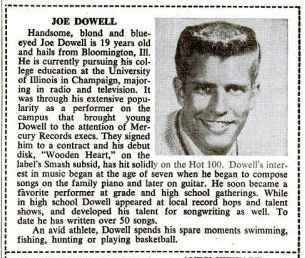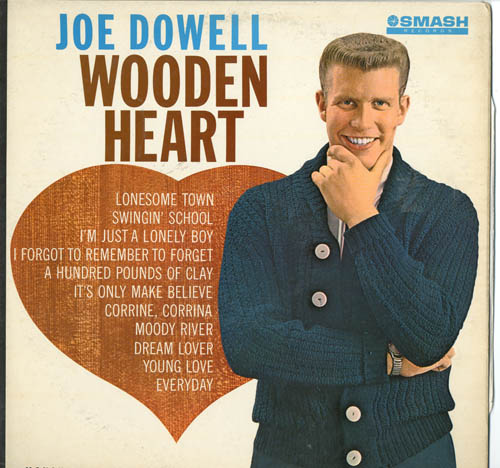 |
| Billboard, July 3, 1961 |
Here is part 2 of my interview with Joe Dowell, which continues from here. In this segment, he talks about his first hit, "Wooden Heart," and his first album.
The story of how he came to record "Wooden Heart" is much more involved than he describes here; you can read the full story in my liner notes to Dowell's CD on Bear Family Records.
What was your first Smash session like?
I went to the studio to my manager's office first, and while I was looking at my four songs, three of which I had written and one by Jodi Bancino called "Little Bo Peep," somebody came in the door with Elvis' album G.I. Blues. I thought that it could be a chance for a giant record because ["Wooden Heart"] was big overseas, big in England, around the world, but for some unknown reason, RCA Victor never released [it as] a single by Elvis in the United States.
My managers got word of this, knowing of "Wooden Heart"'s already-great mileage for great success. They convinced me to do it that day, for we got the song on Elvis' G.I. Blues album just a few hours before the recording session. So I immediately began to learn "Wooden Heart" from Elvis Presley's movie track G.I. Blues, and they even hired a German teacher, Eddie Wilson, to tutor me the German. We were in the back seat of the taxi cab going to Bradley's Barn, working on the German in the taxi on the way to the microphone.
Well, I got it down enough that I recorded it that day. Everybody liked it, but some unique things about the music: Whereas Elvis had an actual accordion, a real accordion, playing the certain German accordion-type licks, Ray Stevens was imitating the chintsy little accordion sound on an electric organ. So Ray Stevens, the famous guy with "Ahab the Arab" and "The Streak," before he was even known, he was playing the accordion—aping it—on an organ for "Wooden Heart." We had another, Jerry Kennedy, playing bass, whereas Elvis had an actual tuba going. Jerry Kennedy played the bass and imitated the tuba with his bass guitar. If I'm not mistaken, I think the Anita Kerr Singers and Jordanaires were in some of the background on that record.
Nevertheless, we got a pretty unique sound. It was released in June of '61. Ninety days later, my single "Wooden Heart" found its way to #1 in the nation on the record charts. So I was quite astounded, amazed. One person said that many people have to pay their dues, record five or ten years before they get a #1 record. This was my very first 45 I had ever even put out.
But there is a funny story that maybe I'm not so proud of this, that I did a little bragging, like Joe Namath and the New York Jets. He said, "I know we're going to win the Superbowl." Well, I said the same thing: I know my first record is going to go to #1. I just feel it. I know it will! Well, it did. But before I even recorded it, I had told a few people around Music City that my first record is going to go to #1, and I was ridiculed for that. They laughed at me, they tore me down behind my back, but then the story came from Red Sovine, and Red Sovine was a famous country singer, and I learned this from his son Roger Sovine—Red Sovine's son Roger. So, Roger told me one day that his dad revealed something quite funny, that when I first came to Nashville I was a little braggadocio, telling everybody my first record was going to be #1, and that was when the controversy, all the bad press—people were talking about and ridiculing that I had said, "Oh, I just feel that my first record is going to go to #1," and then Red Sovine told Roger that when it went to #1, all the backstabbing stopped on Music Row. They didn't say anything anymore.
You said you recorded a few cuts before "Wooden Heart"?
Nothing. No records whatsoever.
You mentioned "Little Bo Peep."
Oh, that was on the same session.
You did a four-song session?
Four-song session.
Who played the saxophone break on "Little Bo Peep?"
I think it was Boots Randolph.
It's amazing. It's really ferocious. That the hardest rocking performance of your career.
Yeah.
But that's not what you wanted to do.
No, it isn't.
It's a great performance!
I think it was Boots. Nobody could play sax [like him] and still, he's playing around, and he's a great, great musician.
You probably thought that you had it made after you immediately reached #1 with "Wooden Heart."
I was too obsessed with—and I know many others have been—I thought that would be a way to find inner fulfillment. Why do we.... Why are we driven? Maybe it's more than the fun of a little singing. Maybe it's more than just picking a little guitar. Maybe it is like the movie Fame. Maybe these life incidents cause certain things to happen where we are driven to try to make up for a vacuum or some kind of an emptiness. And I know, without question, that the motivation driving me was the tragic childhood and a lot of other things that happened too.
I was taught by culture that I was nothing and I had to make up for this sense of void, and if I get stage lights and fame and money then I would be happy. Nevertheless, I found that fifteen—maybe mine was fourteen and a half—minutes of fame.... Maybe it wasn't totally fifteen, but the phone began to ring as a kind of stamp of approval, kind of a little confirmation of fame. The phone began to ring, and lo and behold, one day it was Jimmy Dean. And he had a lot of fame at that time from "Big Bad John."
And his TV show.
Right. And Jimmy Dean wanted me to travel Canada with him. Patsy Cline was there on the stage, and George Hamilton IV again, and Jimmy Dean, and a little guy named Joe Dowell. I was only 21. And I had the privilege of traveling Canada with these famous stars.
For example, at the Calgary Stampede [Corral] rodeo arena, there were over 50,000 to 75,000 people that saw me sing, and I walked out with a guitar, and "Wooden Heart" had gotten to #4 in Canada.
And then I got to sing with Bobby Vinton, Minnesota State Fair, Tony Orlando & Dawn—did a show with them in New York. And I'll never forget, Tony walked up with my album and he commented that he loved it and a lot of his friends did.
And I sang with Phyllis Diller and Dennis Day, the great singer from Jack Benny's comedy show. This was the Milwaukee Spectacle of Music in Milwaukee, Wisconsin. And, interestingly, "Wooden Heart" sold more records in this German city of Milwaukee than any other city in America because of the German in it. And as a result, I was honored to be on the stage with Phyllis Diller and Jack Benny. Bing Crosby's band, Bob Crosby & the Bobcats, were the backup artists, the backup singers and band, that time.
 |
| Milwaukee Sentinel, July 16, 1961 |
There were other opportunities to sing with some stars: Bobby Rydell in the Steel Pier in Atlantic City. A lot of doors opened to sing with Sheb Wooley at another state fair somewhere.
Did you make television appearances?
I made a few. There was a lot of interviews. Of course, when "Wooden Heart" was making it, what was fascinating was to help the label—I should have brought this in earlier, but it's still time. Just about the beginning of the release of "Wooden Heart," this was around June, I was sent with a very, very large man named Danny in a low-slung Thunderbird. We went on a one-month barnstorming tour to promote "Wooden Heart," and we traveled by car for one solid month to every major city east of the Mississippi to promote this little 45, "Wooden Heart": Chicago, Cleveland, New York, Philadelphia, Pittsburgh, Atlantic City, St. Louis, and all the major record-breaking towns in between. And one of the fascinating things to realize is there were about five other cuts of "Wooden Heart" that were sent to the radio stations I had to compete with. Well, fascinating—when I went to a town, the disc jockeys hadn't yet decided which version of "Wooden Heart" play. But because I went in with Danny and offered myself to go to interviews, to record hops, TV shows, they began to play my version. So they went on the Smash Joe Dowell version of "Wooden Heart" and none of the others.
Back at Mercury headquarters in Chicago, they observed a rather phenomenal thing. Every time I would go to a town—let's say Cleveland—and the radio stations would start playing my version, record sales would skyrocket, and they could follow my trajectory of promotion by the sales. Like little forest fires would start there, and then another forest fire would burst out there, and they could follow my journey of record promotion by the tremendous increase of record sales in those towns. For one simple reason: the disc jockeys would begin playing our version of "Wooden Heart." So there was some interesting things like that that took place in the early years of promoting "Wooden Heart."
Did the album follow then?
Within a few weeks.
They rushed you into the studio.
Yeah, and did Joe Dowell Sings the Number One Hits, something like that. And I recorded ten of the best top hit records, like "Lonely Boy" and "Dream Lover."
"A Hundred Pounds of Clay."
Yeah.
Who selected those songs?
The executives at Mercury, Shelby Singleton, and a few others.
Then you had to learn these songs.
Crash course. Just learn them in a day or two.
Your phrasing is very similar to the hit versions.
I was somewhat familiar with them and then played them again when I was in Nashville, rehearsing for the recording sessions. But I have to say, it was assembly-line recording, because these were ten songs I had never really done before. You don't have much time to be married, to get really familiar with the music and the lyrics, but it was a fun session. And I get ridiculed quite a bit for my haircut and the sweater look on the front of that album.
It's kind of a Bobby Rydell sweater.
Yeah. And that hair looks like a mini airport or a swimming pool, my daughters say.
Did the label do that too, or was that your hairstyle?
Oh, I guess that was how I began to comb it for teenage record hops. Just kind of on my own. You get influenced by the looks of all the Bobbys of the world.
(Go to part 3.)

No comments:
Post a Comment